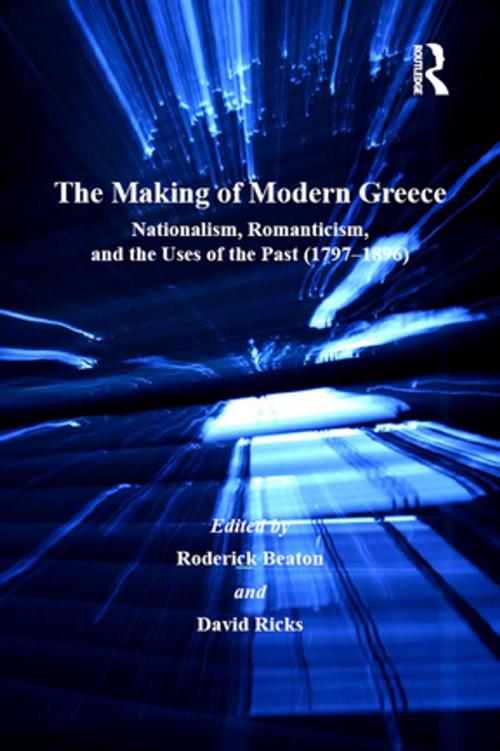The Making of Modern Greece
Nationalism, Romanticism, and the Uses of the Past (1797–1896)
Nonfiction, History| Author: | David Ricks | ISBN: | 9781317024729 |
| Publisher: | Taylor and Francis | Publication: | March 3, 2016 |
| Imprint: | Routledge | Language: | English |
| Author: | David Ricks |
| ISBN: | 9781317024729 |
| Publisher: | Taylor and Francis |
| Publication: | March 3, 2016 |
| Imprint: | Routledge |
| Language: | English |
Every Greek and every friend of the country knows the date 1821, when the banner of revolution was raised against the empire of the Ottoman Turks, and the story of 'Modern Greece' is usually said to begin. Less well known, but of even greater importance, was the international recognition given to Greece as an independent state with full sovereign rights, as early as 1830. This places Greece in the vanguard among the new nation-states of Europe whose emergence would gather momentum through to the early twentieth century, a process whose repercussions continue to this day. Starting out from that perspective, which has been all but ignored until now, this book brings together the work of scholars from a variety of disciplines to explore the contribution of characteristically nineteenth-century European modes of thought to the 'making' of Greece as a modern nation. Closely linked to nationalism is romanticism, which exercised a formative role through imaginative literature, as is demonstrated in several chapters on poetry and fiction. Under the broad heading 'uses of the past', other chapters consider ways in which the legacies, first of ancient Greece, then later of Byzantium, came to be mobilized in the construction of a durable national identity at once 'Greek' and 'modern'. The Making of Modern Greece aims to situate the Greek experience, as never before, within the broad context of current theoretical and historical thinking about nations and nationalism in the modern world. The book spans the period from 1797, when Rigas Velestinlis published a constitution for an imaginary 'Hellenic Republic', at the cost of his life, to the establishment of the modern Olympic Games, in Athens in 1896, an occasion which sealed with international approval the hard-won self-image of 'Modern Greece' as it had become established over the previous century.
Every Greek and every friend of the country knows the date 1821, when the banner of revolution was raised against the empire of the Ottoman Turks, and the story of 'Modern Greece' is usually said to begin. Less well known, but of even greater importance, was the international recognition given to Greece as an independent state with full sovereign rights, as early as 1830. This places Greece in the vanguard among the new nation-states of Europe whose emergence would gather momentum through to the early twentieth century, a process whose repercussions continue to this day. Starting out from that perspective, which has been all but ignored until now, this book brings together the work of scholars from a variety of disciplines to explore the contribution of characteristically nineteenth-century European modes of thought to the 'making' of Greece as a modern nation. Closely linked to nationalism is romanticism, which exercised a formative role through imaginative literature, as is demonstrated in several chapters on poetry and fiction. Under the broad heading 'uses of the past', other chapters consider ways in which the legacies, first of ancient Greece, then later of Byzantium, came to be mobilized in the construction of a durable national identity at once 'Greek' and 'modern'. The Making of Modern Greece aims to situate the Greek experience, as never before, within the broad context of current theoretical and historical thinking about nations and nationalism in the modern world. The book spans the period from 1797, when Rigas Velestinlis published a constitution for an imaginary 'Hellenic Republic', at the cost of his life, to the establishment of the modern Olympic Games, in Athens in 1896, an occasion which sealed with international approval the hard-won self-image of 'Modern Greece' as it had become established over the previous century.















